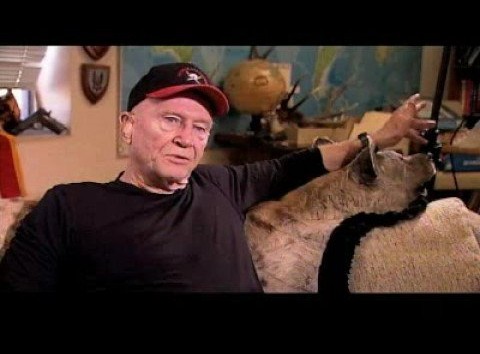LTC Robert K. Brown, USAR (Ret.) the father of “participatory journalism”
 Lieutenant Colonel Robert K. Brown, USAR (Ret.) has published his autobiography titled, “I Am Soldier of Fortune: Dancing with Devils“. I received a copy for review. Robert K. Brown’s (or RKB as he is known to his friends) book is more than just an autobiography, it is a monumental lesson in American and world history.
Lieutenant Colonel Robert K. Brown, USAR (Ret.) has published his autobiography titled, “I Am Soldier of Fortune: Dancing with Devils“. I received a copy for review. Robert K. Brown’s (or RKB as he is known to his friends) book is more than just an autobiography, it is a monumental lesson in American and world history.
RKB’s book reads like a Tom Clancy novel, may Tom rest in peace.
A lover of good whiskey, danger and going where the action is, usually on his own dime, makes him a modern day Ernest Hemingway. Unlike Hemingway who wrote fiction based upon his adventures, RKB writes non-fiction reporting on his personal experiences.
The best time in RKB’s life was when he was Captain Brown, Special Forces Team Leader of A-334, Tong Le Chon, South Vietnam, just five kilometers from the Cambodian border from 1969 to 1970. RKB credits Special Forces LTC Michael Lanter for assigning him to the position, which he describes as the “most challenging and memorable” of his entire life.
So why is RKB the father of “participatory journalism”?
As Founding Father and President John Adams wrote, “I must study politics and war that my sons may have liberty to study mathematics and philosophy.” RKB is more than a student of politics and war he is a practitioner of politics and war. As Carl Philipp Gottfried von Clausewitz wrote in Vom Kriege (On War), “War is the continuation of politics by other means.” RKB has lived what Adams and Clausewitz captured in their statements. RKB is by definition the father of “participatory journalism”, which means get to the war, if necessary participate in the war and then report on the war. He is also a “man among men”, a phrase which has a special meaning to RKB. More about that later.
RKB writes, “I personally led groups of seasoned SpecOps [Special Operations soldiers] or sent them independently into Afghanistan, the Sudan, El Salvador, Uganda, Rhodesia, Angola, the Congo, Lebanon, Mozambique, Burma, Laos, Chad, Nicaragua, Sierra Leone, Israel, Croatia, Bosnia and a good few others that I haven’t written about.”
RKB and his team of combat tested and seasoned “participatory journalists” have provided intelligence on former Soviet Union weapons and ammunition to the CIA. He has been quoted by the Associated Press and investigated by the FBI. RKB was targeted by Generalísimo Rafael Trujillo (El Jefe), the former Dominican Republic dictator, for assassination. One of his columns directly resulted in the assassination of Regino Camacho, a weapons manufacturer under Fidel Castro by Trujillo. At the time RKB had left Cuba so the hit team missed him by mere days.
 RKB started as a Castro supporter and after the Cuban revolution turned into a fervent anti-communist. He founded Soldier of Fortune (SOF) magazine and remains its publisher and guiding force. SOF is credited with exposing the use of “Yellow Rain” (chemical weapons) by the Soviets and their communist allies in Vietnam and Laos during the 1980s. SOF’s column about the conflict in Rhodesia energized the global mercenary community to rush to volunteer to serve in the Replica of Rhodesian Army, with 74% of recruits saying they learned about the fight via SOF. RKB was the inspiration for Sylvester Stallone’s movies “The Expendables”.
RKB started as a Castro supporter and after the Cuban revolution turned into a fervent anti-communist. He founded Soldier of Fortune (SOF) magazine and remains its publisher and guiding force. SOF is credited with exposing the use of “Yellow Rain” (chemical weapons) by the Soviets and their communist allies in Vietnam and Laos during the 1980s. SOF’s column about the conflict in Rhodesia energized the global mercenary community to rush to volunteer to serve in the Replica of Rhodesian Army, with 74% of recruits saying they learned about the fight via SOF. RKB was the inspiration for Sylvester Stallone’s movies “The Expendables”.
Many are reading about Islamic mercenaries going to Syria, Afghanistan, Egypt and Iraq to fight. What you do not read about are American mercenaries going to fight around the world against those who would do us harm.
“I Am Soldier of Fortune” is a must read, if you are man or woman enough.


